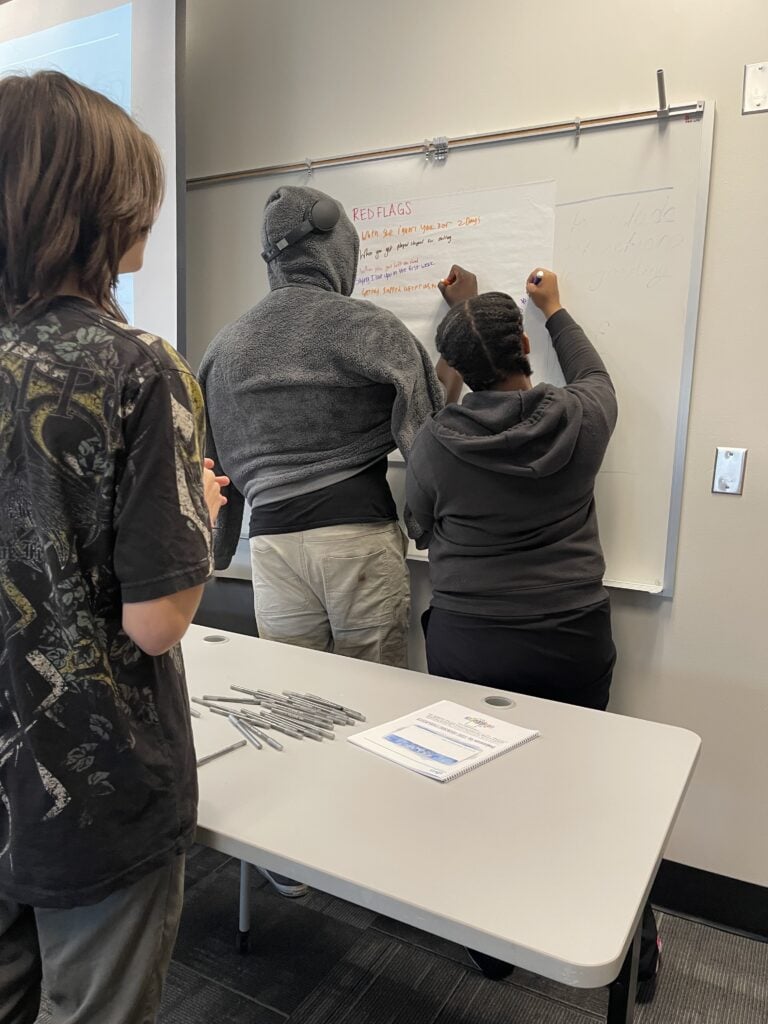“You too friendly.”
“That’s toxic.“
“You’re delulu.“
Many boys don’t even realize when they are in a toxic or abusive relationship, and when they do, many cases go unreported because they fear being emasculated.
These are some of the phrases Jala Powell, the youth program director for the Domestic Violence Network, hears from students during their Change Project program sessions.
The Change Project is their evidence- and research-based youth program primarily serving IPS; although, they offer services to any school district. It teaches teens how to become advocates against teen dating violence.
The gender-inclusive curriculum teaches teens about healthy relationships, boundaries, teen dating violence, consent and communication.
RELATED: Domestic Violence Network hosts Family Fun Fest to bring resources to Martindale-Brightwood
“It’s always shocking to hear teens say they wouldn’t like it if their partner was too friendly. I’m like, ‘Wouldn’t you want to date someone polite or has things going on outside of you?’” said Powell.
“Social media has really taught them that it’s cute to be crazy and possessive. It’s cute to only want to be with your partner. The boys in particular will either notice something isn’t healthy, or they will assume domestic violence doesn’t apply to them because they’re boys.”
Teen boys are affected by domestic violence
According to the CDC, about 1 in 12 U.S. high school students experience physical dating violence.
Powell said a lot of teens she has served view toxic relationships as healthy and view healthy relationships as toxic.
Abusive teen relationships stem from insecurities and teens having increased access to each other both in person and online.
Unlearning these behaviors also means unlearning the idea that boys do not experience domestic violence.
If men do speak up, it’s likely it won’t be taken as seriously as it should.
– 16-year-old Sierra from Monroe County
“I remember I had one boy during the session speak openly. He said, ‘I don’t see why it’s okay for a girl to hit me, but if I hit her back, the world stops.’ That’s why we don’t use the term ‘he’ when talking about abusers in the curriculum,” said Powell.
Females are two times more likely to seek help than males according to Powell.
1 in 3 students will experience some type of abuse.
Only 9 percent of students will ask for help, and it most likely will not be from an adult.
Powell believes there should be more peer-led groups discussing domestic violence because students tend to listen to each other more than they do adults.
“It’s time for us to take teen dating violence seriously. We can’t just write it out as it’s just what kids do. We also can’t keep pointing to only men or boys being the abusers when women and girls can be just as abusive,” said Powell.

Teaching teen boys the signs of domestic violence
Shonna Majors, executive director of the Martindale-Brightwood Community Center, said the Martindale-Brightwood zip code, 46218, has a high occurrence of domestic violence calls to IMPD, which is why they started an initiative to address DV in high schools.
She would notice girls hitting boys in schools, which prompted her to explain to boys that they can also be abused.
According to the Quality Improvement Center on Domestic Violence in Child Welfare, one in five children are exposed to family violence in their lifetime, including witnessing violence against a parent or sibling.
By age 17, approximately one-third of youth have witnessed family violence.
Last month, Majors spoke at Arsenal Technical High School.
“They’re embarrassed to say they’re being abused. They don’t know where to go to or who to talk to and get help. We wanted to create a space for young boys to have a better understanding of how their relationship choices are affecting them mentally and physically,” said Majors.

Crazy ain’t cute
She sees a lot of violence occurring in the Martindale-Brightwood community and said a lot of this is due to not being able to have an open conversation about it that can lead to understanding.
“There’s not a lot of research on the boys because no one is coming forward. I’m hoping that the work that we’re able to do and embark on will last way longer than where we’re at right now,” said Majors.
It’s pretty common for high school girls to expect their boyfriends to not talk to any other girls, and they can be paranoid that he is cheating and may even check his phone for any suspicious conversations with other women.
– 17-year-old Graylie from Monroe County
“It’s pretty common for high school girls to expect their boyfriends to not talk to any other girls, and they can be paranoid that he is cheating and may even check his phone for any suspicious conversations with other women.” – 17-year-old Gary
Contact staff writer Jade Jackson at (317) 762-7853 or by email JadeJ@IndyRecorder.com. Follow her on Twitter @IAMJADEJACKSON








